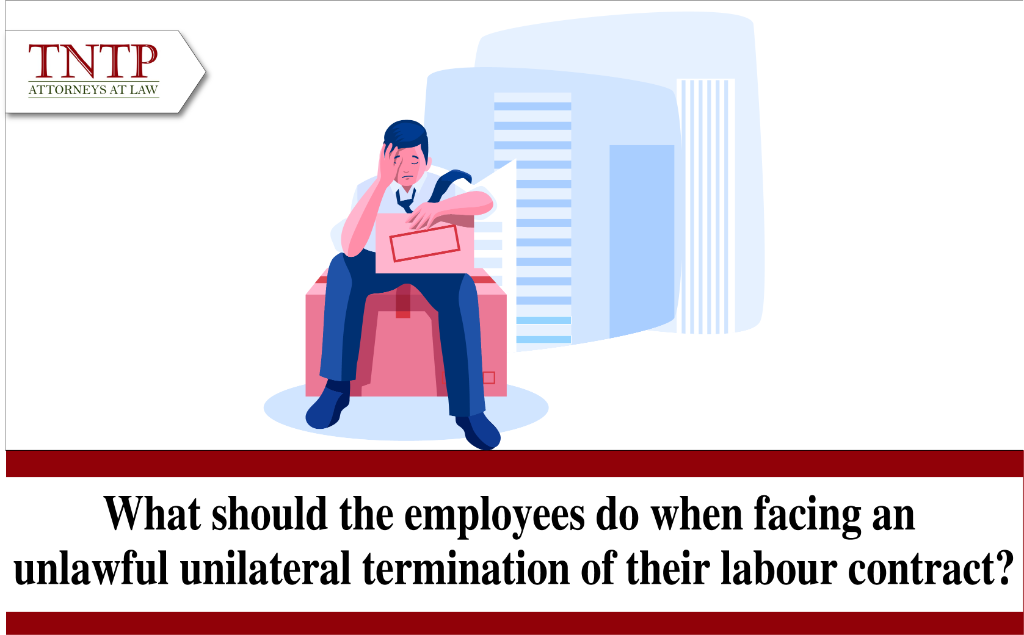Unilateral termination of a labour contract is an act by one party in the employment relationship that actively terminates the labour contract without depending on the will of the other party. Labour laws stipulate cases where the employer has the right to unilaterally terminate the labour contract with the employee. However, many employers do not adhere to the law and terminate the labour contract unlawfully with employees. So, in such cases, what should employees do to protect their rights and interests? In this article, TNTP will present the content that employees should consider applying.
1. Collect evidence related to the unlawful termination of the labour contract
From the moment an employee is unilaterally terminated by the employer, if the employee believes that the termination is unlawful, he/she needs to promptly gather evidence related to the incident, including the labour contract, the employer’s minutes determining the employee’s violation leading to the unilateral termination of the labour contract, the decision to terminate the labour contract, payment documents from the employer, internal documents of the enterprise related to the termination of the labour contract, etc.
It can be said that the collection of evidence by employees plays an extremely important role in proving that the employer’s unilateral termination of the labour contract is unlawful.
2. Assess the legality of the employer’s unilateral unlawful termination of the labour contract
To determine the legality of the employer’s unilateral unlawful termination of the labour contract, employees need to rely on legal provisions and legitimate internal documents of the enterprise.
Firstly, employees need to determine whether the grounds used by the employer to unilaterally terminate the labour contract are in accordance with the provisions of Article 1, Clause 36 of the 2019 Labour Code (“LC”) or not.
Secondly, employees need to review the internal documents of the enterprise related to the unilateral termination of the labour contract, such as labour regulations, collective labour agreements, criteria for assessment of employees’ fulfilment of duties, etc., to determine whether the enterprise has conducted any actions that are inconsistent with the provisions of these internal documents.
Thirdly, employees need to ascertain whether the employer notified them in advance of the unilateral termination of the labour contract in accordance with the provisions of Clauses 2 and 3 of Article 36 of the LC.
3. Identify the rights and benefits that employees are entitled to under the law
Firstly, regardless of whether the unilateral termination of the labour contract is lawful or unlawful, the employer has certain obligations towards the employee: i) Fully pay all amounts related to the employee’s rights and benefits; ii) Complete the procedures for confirming the period of social insurance, unemployment insurance, and return relevant documents to the employee; iii) Provide copies of documents related to the employee’s work process if requested. Costs of copying and sending documents are borne by the employer.
Secondly, in the case of the employer’s unilateral unlawful termination of the labour contract, the employer must fulfil the obligations specified in Article 41 LC, such as the employer must reemploy the employee under the agreed labour contract; the employer must pay salary, contribute social insurance, health insurance, unemployment insurance for the days the employee is not allowed to work and pay an additional amount to the employee, at least equivalent to 02 months’ salary under the labour contract.
Therefore, based on the actual situation, employees can request the employer to provide appropriate benefits in accordance with legal regulations, the labour contract, and the internal documents of the enterprise.
4. Request relevant individuals, agencies, and organizations to resolve the issue
When employees have grounds and evidence showing that the employer has unilaterally terminated the labour contract unlawfully, employees can first request the representative organization of employees at the workplace to protect their rights.
In cases where the enterprise does not have a representative organization of employees at the workplace, employees can directly negotiate with the employer, request the employer to fulfil responsibilities and provide benefits. In case the negotiation is not successful, employees can request the following individuals, agencies, and organizations to protect their rights: Chief Inspector of the Department of Labour – Invalids and Social Affairs where the employers headquarter is located; Labour mediator; Labour arbitration council; Competent court; Other agencies and organizations such as social insurance agency, Vietnam General Confederation of Labour, city-level Confederation of Labour where the employers headquarter is located.
Furthermore, employees should consider seeking legal assistance from specialized labour lawyers. Lawyers possess extensive experience and specialized knowledge, thus they can assist employees in resolving the issue, proposing resolution directions, drafting documents, providing advice, and representing employees in the process of protecting their rights.
In conclusion, when faced with unilateral unlawful termination of the labour contract, employees should familiarize themselves with relevant legal provisions, collect evidence, and seek support from individuals, agencies, and organizations with jurisdiction to protect their rights.
This is the article “What should the employees do when facing an unlawful unilateral termination of their labour contract?” that TNTP sends to the readers. If have any issues to discuss, please contact TNTP for assistance.
Sincerely,








